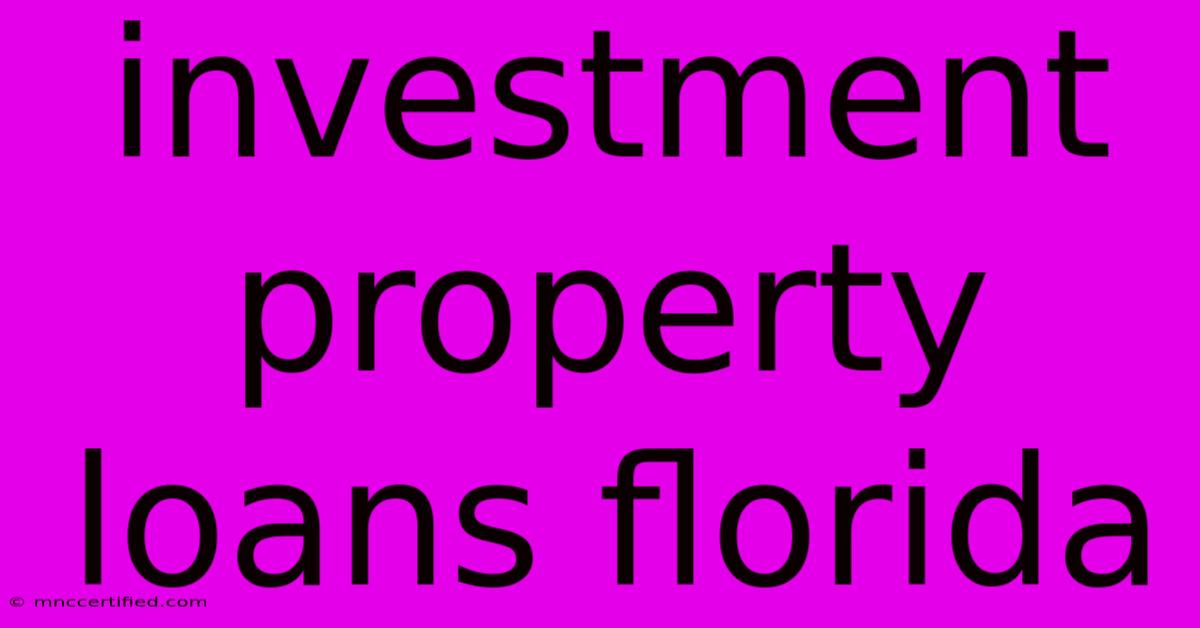Investment Property Loans Florida

Table of Contents
Investment Property Loans Florida: Your Guide to Financing Your Florida Real Estate Venture
Florida's vibrant real estate market presents lucrative opportunities for investors. However, securing the right financing is crucial for success. This comprehensive guide will walk you through everything you need to know about investment property loans in Florida, helping you navigate the process and find the best loan for your needs.
Understanding Investment Property Loans in Florida
Investment property loans differ significantly from traditional home loans. Lenders assess your financial situation more rigorously, considering factors beyond your credit score. They carefully analyze your rental income potential, debt-to-income ratio (DTI), and the property's value. Understanding these differences is paramount to securing approval.
Key Differences from Residential Loans:
- Higher Down Payments: Expect down payments ranging from 20% to 30%, sometimes even higher, depending on the lender and the property type. This larger down payment reduces lender risk.
- Stricter Qualification Requirements: Lenders scrutinize your financial history, including your rental income, debt-to-income ratio, and credit score, far more stringently than with residential loans.
- Higher Interest Rates: Investment property loans typically carry higher interest rates than residential mortgages due to the perceived higher risk.
- Different Loan Types: You might encounter loan options specifically designed for investment properties, such as commercial loans or portfolio loans, in addition to standard mortgages.
Types of Investment Property Loans in Florida
Florida offers several loan options for investors. Choosing the right one depends on your specific circumstances and investment strategy.
1. Conventional Loans:
These loans are not backed by government agencies like FHA or VA. They usually require a higher down payment and credit score but often offer competitive interest rates.
2. FHA Loans:
While primarily designed for owner-occupied properties, FHA loans can be used for investment properties under certain conditions. The requirements are stricter, and you might need to meet specific occupancy requirements.
3. Portfolio Loans:
These loans are offered directly by lenders who keep them on their balance sheet instead of selling them on the secondary market. They often cater to borrowers with less-than-perfect credit or those purchasing more challenging properties.
4. Commercial Loans:
For larger-scale investments, such as apartment complexes or commercial buildings, commercial loans are the more suitable option. These loans typically involve more complex underwriting processes.
Finding the Right Lender for Your Investment Property in Florida
Selecting the right lender is as critical as choosing the right property. Shop around, compare interest rates, fees, and loan terms from multiple lenders. Consider these factors:
- Interest Rates: Compare rates from various lenders to secure the best possible deal.
- Loan Fees: Understand all associated fees, including origination fees, appraisal fees, and closing costs.
- Loan Terms: Analyze the loan's length, repayment schedule, and prepayment penalties.
- Reputation and Customer Service: Choose a lender with a strong reputation for providing excellent customer service.
- Local Expertise: Opting for a lender with strong Florida market knowledge can provide valuable insights.
Essential Tips for Securing an Investment Property Loan in Florida
- Improve your credit score: A higher credit score significantly improves your chances of loan approval and secures better interest rates.
- Maintain a healthy debt-to-income ratio: Keep your debt low compared to your income.
- Document your rental income: Prepare thorough documentation of your rental income to showcase your ability to repay the loan.
- Secure a strong down payment: A larger down payment reduces the lender's risk and improves your approval odds.
- Work with a mortgage broker: A broker can shop around for the best loan options on your behalf.
Navigating the Florida Real Estate Market
The Florida real estate market is dynamic. Understanding local market trends and regulations is crucial for successful investing. Researching property values, rental rates, and local regulations is essential for making informed decisions.
Conclusion: Your Path to Florida Investment Success
Securing an investment property loan in Florida requires careful planning and preparation. By understanding the various loan types, diligently preparing your financial documentation, and working with a reputable lender, you can significantly increase your chances of success in the Florida real estate market. Remember to always seek professional financial and legal advice to tailor your strategy to your specific circumstances.

Thank you for visiting our website wich cover about Investment Property Loans Florida. We hope the information provided has been useful to you. Feel free to contact us if you have any questions or need further assistance. See you next time and dont miss to bookmark.
Featured Posts
-
Best City For Investment Property
Nov 20, 2024
-
Adam Schneider Fisher Investments
Nov 20, 2024
-
Chip And Dale Disney Trading Pins
Nov 20, 2024
-
Investment Companies In London Uk
Nov 20, 2024
-
Argentina Player Ratings Vs Peru
Nov 20, 2024